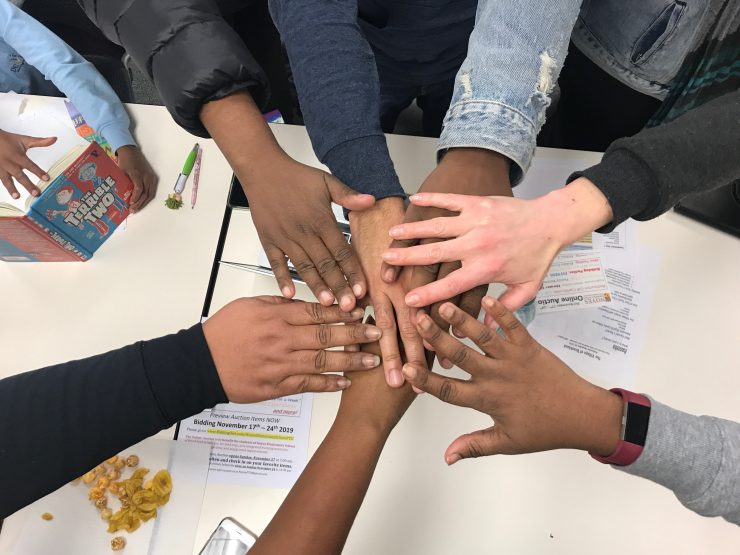Tensions in Brookland were running high this spring. Newer residents had started calling the police on children and teenagers after school as they were walking home and stopping by convenience stores — something most kids are prone to do.
So community members decided to confront the issue. On March 26, members of the Brookland Middle School parent-teacher organization held a meeting where parents provided statements from students who confessed to feeling unsafe in their own neighborhoods.
“They were calling the cops on kids because they were laughing in the alleyway, I mean are you kidding me? That’s silly,” said Jhonna Turner, parent engagement program coordinator for the Washington Lawyers’ Committee.
After the meeting, Turner realized there was an opportunity to do something more. With support from the Washington Lawyers’ Committee, where her job is specifically designed to facilitate community organizing, she brought together local pastors, parents and other professionals to create the Village of Brookland organization.
Though the nonprofit is still in its early stages, the Village of Brookland will grow in the next year to support not just Brookland Middle School but every public school in the Brookland neighborhood. In a neighborhood where wealthy white residents are sending their kids to private or charter schools, Village of Brookland plans to provide resources to Brookland’s public schools and change narratives around the public school system in the neighborhood.
“We have older people, younger people, Brooklanders who’ve lived there their whole lives, people who have just moved in,” Turner said. “We’re just trying to make sure that all kids have equal resources and opportunities.”
“We’re just trying to make sure that all kids have equal resources and opportunities.”
In Philadelphia, a coalition of parent-teacher organizations has worked since 2012 to spread organizing ideas for school support and revitalize public schools in underserved neighborhoods in a manner similar to the Village of Brookland. In his role as education committee chair in Philadelphia’s Crosstown Coalition, Jeff Hornstein runs the Friends of Neighborhood Education group (FONE), where he has found ways to facilitate city-wide support for the public school system.
“There’s always power in networks,” Hornstein said. “When you’ve got schools, contiguous schools working together, you start to build more of a buzz.”
Philadelphia is different from Washington in that it’s still in the early stages of gentrification following its near-bankruptcy in the ‘80s. Even so, Hornstein acknowledges that there’s a fine line between getting newer, whiter residents to contribute to their local schools and gentrifying established communities out of their neighborhoods. He said he’s found that part of building equitable support for public schools meant getting well-meaning white people in Philadelphia neighborhoods to put their money, and kids, where their mouths were.
“It’s really about a narrative change. More resources, and change the narratives,” Hornstein said. “If you are truly a person who espouses equity and equal opportunity, does that argument stop at the schoolhouse door?”
In Brookland, Turner is up-front about the fact that the issue of support for public schools has a racial component. The students who were getting the police called on them were not white, while the people who were calling the police often were, Turner said. In a one-page flyer the Village of Brookland shares with community members, the organization describes its goal as putting “an end to separate and unequal schools in Brookland.”
The numbers appear to support the organization’s allegation of “separate and unequal” schools. Brookland Middle School is 94% black, while the neighborhood is only 64% black, according to U.S. Census data. Nearby Elsie Whitlow Stokes Community Freedom Public Charter School is 39% black, and Washington Yu Ying Academy, a charter school by Catholic University is 33% black.
“You have parents that chime in saying they’ve been living in the neighborhood their whole lives and they don’t feel comfortable in their neighborhood anymore,” Turner said. “It’s more than just providing resources in their school, it’s about the kids feeling more comfortable and more confident.”
“They’ve been living in the neighborhood their whole lives and they don’t feel comfortable in their neighborhood anymore.”
Ebony Lea is the CEO of A Fresh Start Therapy and lives in the Brookland area. Though she doesn’t have children, Lea began attending Village of Brookland meetings to get involved in supporting the neighborhood’s schools. She said \that as a resident and as someone who attended public schools in Washington, she understands the importance of supporting the next generation of students.
“Children grow up to be adults,” Lea said. “I think something we forget is that children need [positive] experiences in their schools.”
Lea feels it’s important for communities to provide extra support for their public schools when competing charter schools are frequently well-funded and well-supported by high-income parents. She said having a long-term public middle school is a major ingredient for families to maintain a generational connection to their neighborhood.
“The school’s really doing some positive things and we want to support them,” Lea said. “We want families to get to a point where after 20 years they can say, ‘My kids are going to Brookland Middle School.’”















Add comment